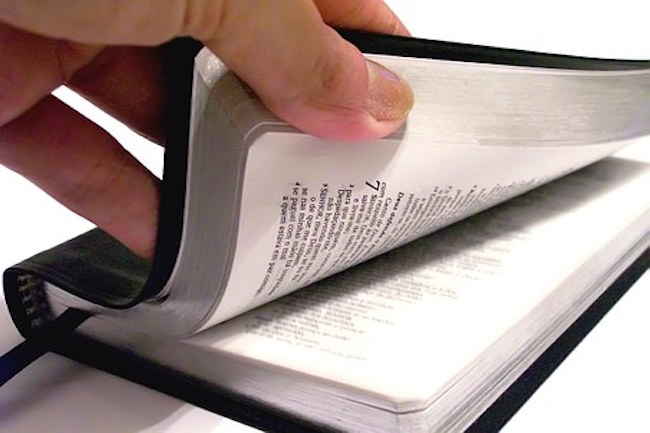5 MYTHS ABOUT THE BIBLE by Chris Bruno for Core Christianity
Myth #1: The text and translation of the Bible is completely unreliable.
In a Newsweek article a few years back, the author claimed, “No television preacher has ever read the Bible. Neither has any evangelical politician. Neither has the pope. Neither have I. And neither have you. At best, we’ve all read a bad translation—a translation of translations of translations of hand-copied copies of copies of copies of copies, and on and on, hundreds of times.”
I hope this is hyperbole because I don’t understand how a journalist could publish this. He is saying that the best we can hope to find is a translation of a translation of a translation. I think he means that our modern English translations of the New Testament are translations of a Latin translation that was a translation of the original Greek. I can’t speak for televisions preachers, evangelical politicians, or the pope, but I know that I have many students and colleagues who read the Greek New Testament quite often and quite well. And what we’ve found is that our English translations—the ESV, the NIV, the NASB and many more—are very reliable translations.
But some might say even if we can translate the Bible, we can never know what the original wording was. After all, the text of the Bible was copied by hand over thousands of years by thousands of people who made tens or even hundreds of thousands of intentional and unintentional mistakes.
It is true that until the 15th Century, the text of the Bible was copied by hand and sometimes scribes made mistakes. But this does not mean the text we have is nothing close to the original writings and completely unreliable. In fact, it is just the opposite, especially when we compare it with other ancient texts. We have over 6,000 manuscripts of the Greek NT (not to mention close to 20,000 ancient translations).
Of the 6,000 Greek manuscripts, the evidence of their contradictions has been greatly exaggerated. While there are many variations in the text, most of these are either spelling differences or word order. There are several other differences that do not change the meaning of the text at all, especially the use of synonyms. Less than 1% of the variants amount to a meaningful change, and none of these affect any essential Christian doctrine. None of this even considers the tens of thousands of Hebrew Old Testament scrolls and codices that show a similar level of reliability. The evidence is clear: our modern English translations are reliable translations of a reliable text.
Myth #2: The books of the Bible were arbitrarily chosen.
I’ll call this second myth The DaVinci Code myth (even though the first myth showed up in that book as well). The story goes something like this: during the first two centuries AD, there were hundreds of Christian documents being used in churches. Books like the Gospel of Thomas, the Acts of Peter, and even the Gospel of Judas were read alongside Matthew, Romans, Revelation, and the rest of the NT books. It wasn’t until Emperor Constantine legalized Christianity in the early 4th century that we narrowed the list down to our twenty-seven NT books. In the DaVinci Code, Dan Brown has one of his characters describe what happened next. “More than eighty gospels were considered for the New Testament, and yet only a relative few were chosen for inclusion—Matthew, Mark, Luke, and John among them.” When asked who decided which Gospels to include, he replied, “The Bible, as we know it today, was collated by the pagan Roman emperor Constantine the Great.” Even though these claims are a little grandiose in Brown’s book, many people believe some version of this today.




